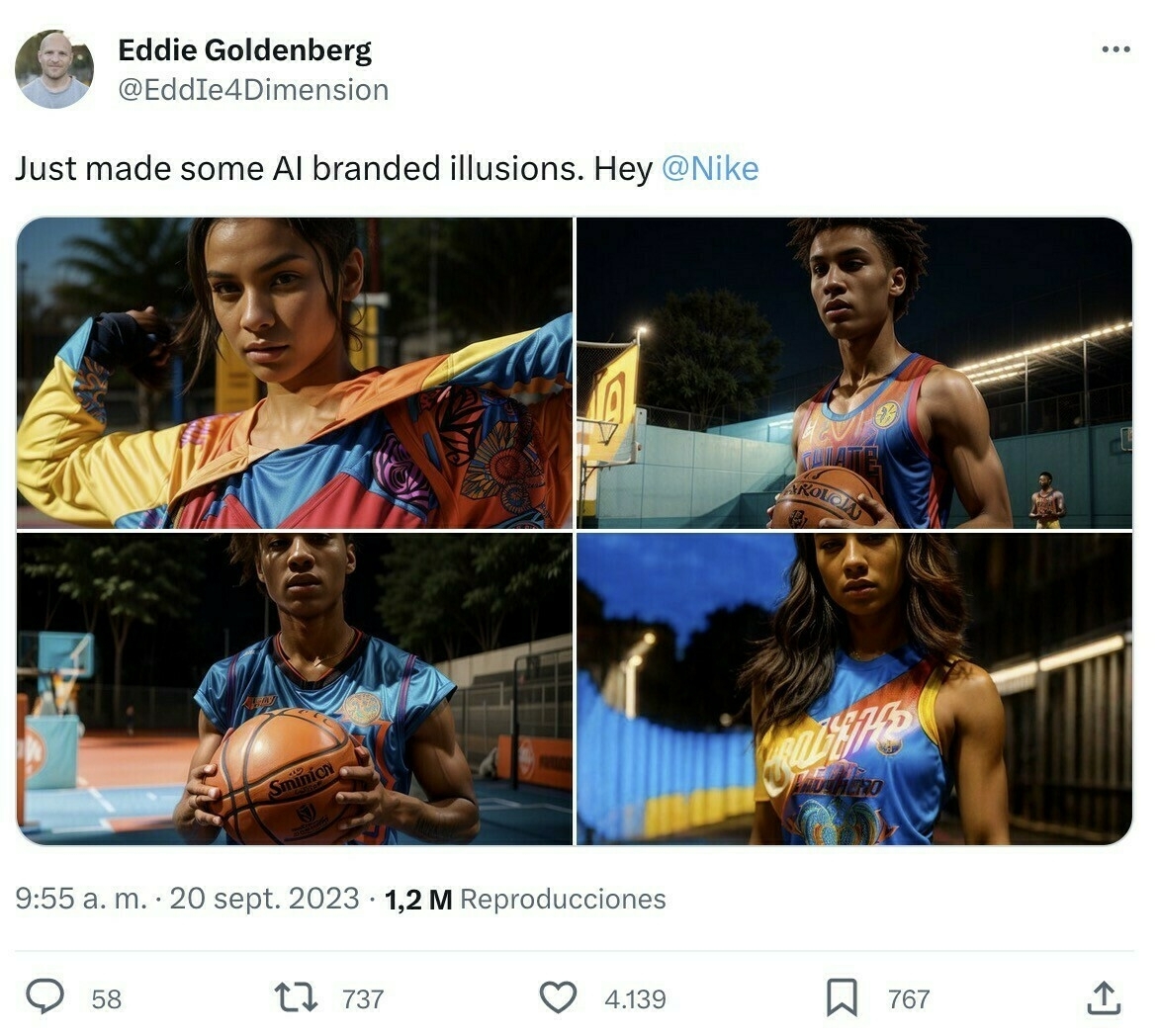'Personalisation' is something that humans do
Audrey Watters, formerly the ‘Cassandra’ of edtech, is now writing about health, nutrition, and fitness technologies at Second Breakfast. It’s great, I’m a paid subscriber.
In this article, she looks at the overlap between her former and current fields, comparing and contrasting coaches and educators with algorithms. While I don’t share her loathing of ChatGPT, as an educator and a parent I’d definitely agree that motivation and attention is something to which a human is (currently) best suited.
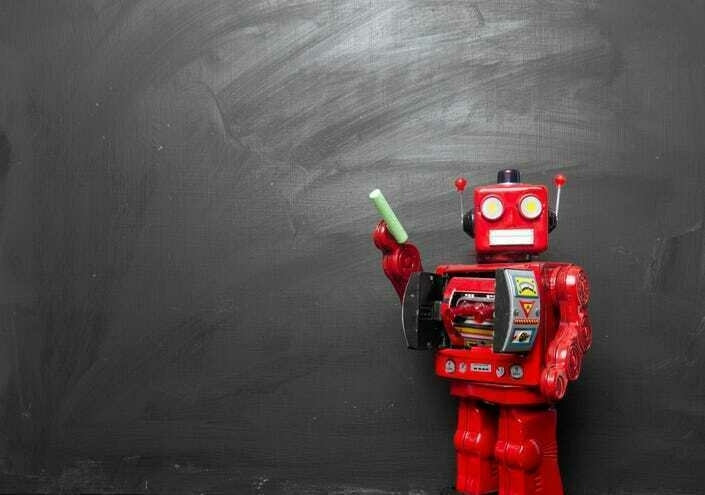
How well does a teacher or trainer or coach know how you feel, how well you performed, or what you should do or learn next? How well does an app know how you feel, how well you performed, or what you should do next? Digital apps insist that, thanks to the data they collect, they can make better, more precise recommendations than humans ever can — dismissing what humans do as “one size fits all.” Yet it's impossible to scrutinize their algorithmic decision-making. Ideally, at least, you can always ask your coach, "Why the hell am I doing bulgarian split squats?! These suck." And she will tell you precisely why. (Love you, Coach KB.)Source: Teacher/Coach as Algorithm | Second BreakfastAnd then (ideally) she’ll say, “If you don’t want to do them, you don’t have to.” And (ideally), she’ll ask you what’s going on. Maybe you feel like shit that day. Maybe you don’t have time. Maybe they hurt your hamstrings. Maybe you’d like to hear some options — other exercises you can do instead. Maybe you’d like to know why she prescribed this exercise in the first place — “it’s a unilateral exercises, and as a runner,” she says, “we want to work on single-leg strength, with a focus on your glute medius and adductors because I’ve noticed, by watching your barbell squats, that those areas are your weak spots.” This is how things get “personalized” — not by some massive data extraction and analysis, but by humans asking each other questions and then tailoring our responses and recommendations accordingly. Teachers and coaches do this every. goddamn. day. Sure, there’s a training template or a textbook that one is supposed to follow; but good teachers and coaches check in, and they switch things up when they’re not really working.
[…]
If we privilege these algorithms, we’re not only adopting their lousy recommendations; we’re undermining the expertise of professionals in the field. And we’re not only undermining the expertise of professionals in the field, we’re undermining our own ability to think and learn and understand our own bodies. We’re undermining our own expertise about ourselves. (ChatGPT is such a bad bad bad idea.)
Migraines and 'ability'
Granted it’s been over a decade, but when I worked at a university I had to be on the ‘disabled’ register due to my migraines. That meant my line manager could make accommodations such as being sat next to a window so the fluorescent lights didn’t trigger me.
Almost everyone I know has some kind of medical condition which affects their work to a greater or lesser extent. These are the things that we used to hide, until we realised (perhaps for the first time during the pandemic) that we’re all just temporarily abled.
This letter in The Guardian is a response to an article about a minister setpping down due to chronic migraines. I don’t get 15 or more a month, as she does, but I probably average 3-4 and, because they add up, it’s imperative that I have flexible working conditions. But then, shouldn’t we all?
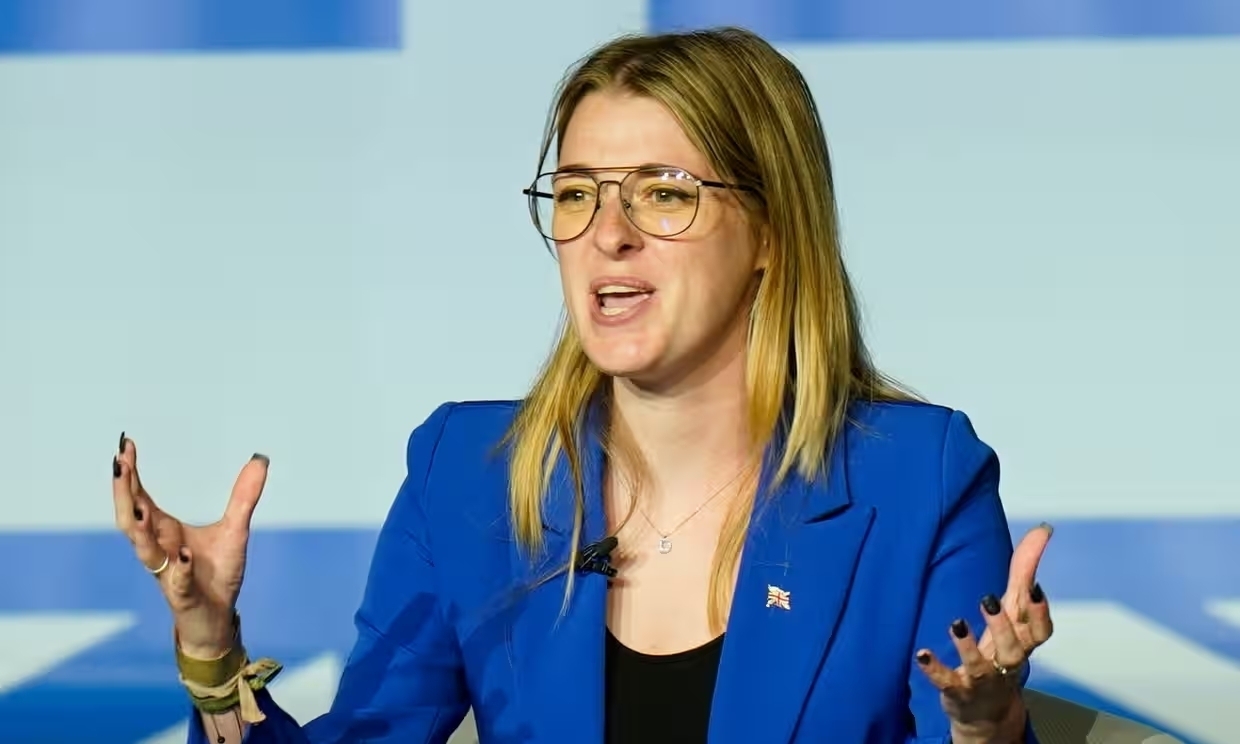
Dehenna Davison has resigned as a minister, citing chronic migraines (Report, 18 September). Migraines are a common and debilitating condition affecting many people; chronic migraine is defined as an ongoing experience of 15 or more migraine days a month. So it is not difficult to imagine how hard it has been for Ms Davison to give the energy she wants to her role.Source: People living with migraines need better support from employers | The GuardianBut while it is valuable that chronic migraines have been given some media attention, it is also troubling that the message is, unfortunately, that those with such conditions do not have equal value and should quit if they can’t manage the job – a message that many people living with migraines and other long-term conditions and disabilities will be familiar with, whatever their role or employer.
Managing work, life and migraines takes more than the “patience at times” that Davison thanks her colleagues for. It needs recognition, respect and a commitment from employers to prioritise the health of workers and support them to work with the condition, not drop back because of it.
Anna Martin Oxford
No career progression on a dead planet
There’s a film starring Matt Damon called Elysium from 2013 in which the wealthy live on a man-made space station in luxury, while the rest of the population live on a ruined Earth. With the latest announcement about a new huge oilfield being opened in the North Sea, the obscene desire for global elites to put profit before planet is clear for all to see.
As we hurtle towards this scenario, many have realised that there is no longer any link between meaningful work, a decent salary, and a fulfilling life.

James, a 31-year-old in Glasgow, had always worked hard, from striving for a first at university to working until 8pm or 9pm at the office in the civil service in the hopes of getting noticed.Source: ‘It felt futile’: young Britons swap career-driven lives for family and fun | The GuardianBut during lockdown in 2020, James had an epiphany about what he valued in life when reading the book Bullshit Jobs by the anthropologist David Graeber. “He talks a lot about how jobs that provide social utility are generally pay-poor while the inverse are paid more,” James says.
James felt he was working doggedly – but not necessarily either generating public good or building a stable financial life. “It felt futile … You can work really hard and you’re still not going to get ahead,” he says.
“Salaries and housing costs are so mismatched at this point that you would really need to jump ahead in your career to be able to buy in parts of the country. Not that [owning property] is the be-all and end-all, but it’s kind of a foundation to having financial stability.”
He now focuses on his life, putting his phone on aeroplane mode while doing activities such as hiking, reading and watching films. “I still value work, I’m very committed to my position. But I’ve just realised that this myth a lot of millennials were told – graft, graft, graft and you’ll always get what you want – isn’t necessarily true,” James says. “It’s a reprioritisation.”
Social mobility in the UK is at its worst in more than 50 years, a recent study from the Institute for Fiscal Studies found, with children from poor households finding it harder than 40 years ago to move into higher income brackets. The IFS said gifts and inheritances from older generations were becoming more important to household incomes.
AI generated images with subliminal messages
You’ve probably seen some of these already. Someone discovered that if you use the generator for QR codes but feed it something different, it can create words from images.
There are lots more examples at knowyourmeme and you can try creating your own using KREA.
ControlNet uses the AI image-generating tool Stable Diffusion, and one of its initial uses was generating fancy QR codes using the code as an input image. That idea was then taken further, with some users developing a workflow that lets them specify any image or text as a black-and-white mask that implants itself into the generated image—kind of like an automated, generative version of the masking tool in Photoshop.Source: AI-Generated ‘Subliminal Messages’ Are Going Viral. Here’s What’s Really Going On | VICE“What happened there was that this user discovered that if they used the QR Code ControlNet but instead of feeding it a QR code, they fed it some other black-and-white patterns, they could create nice optical illusions,” said Passos. “You can now send a conditioning image and the model blends in a pattern that satisfies that while still making a coherent image at the same time.”
On preparing, issuing, and claiming badges
I attended a Navigatr webinar at lunchtime today where they shared this graphic which underscores the importance of encouraging badge earners to share their achievements on social networks.
What I appreciated about the webinar was the way in which the team explained the importance of preparing for and then following up the issue of the badge to ensure that it’s claimed.
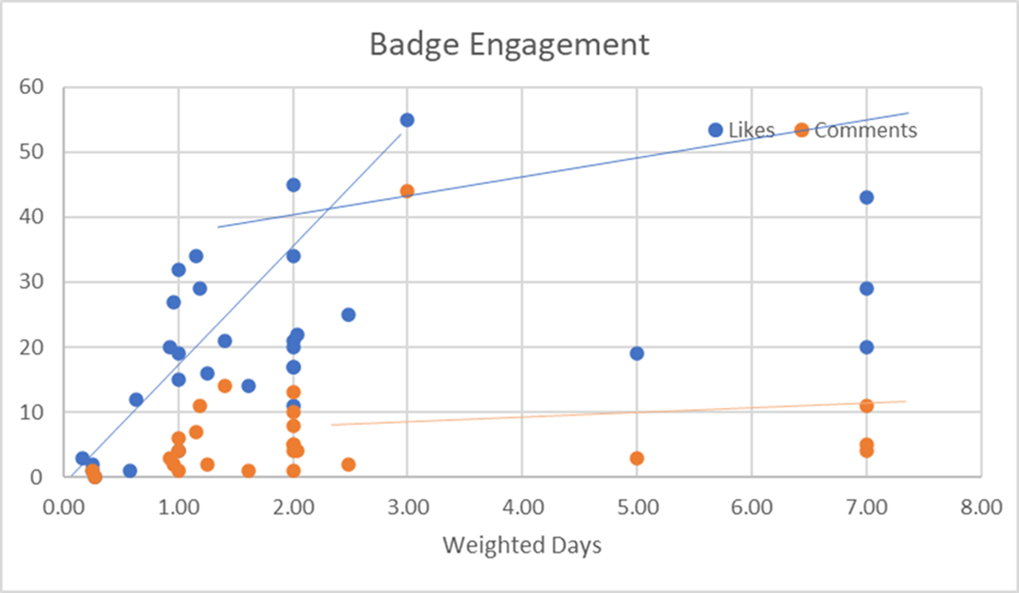
Our study of several recently shared digital badges on social media as shown below showed that on average, a posted badge received 500-1k impressions and 25 interactions, of which, 4-5 were actual comments. We found that the number of connections and days since posted lead to increases in the number of interactions. Engagement seemed to plateau around 4-5 days and those with several hundred to 500+ connections were most likely to receive numerous interactions. Location – whether the US or abroad did not seem to matter, suggesting the power of social media is universal when it comes to engagement.Source: Improve Brand Engagement with Digital Badges | BadgeCert
Telling stories using cartoons
Liza Donnelly is a cartoonist for the New Yorker. In this article, which is an output from some preparatory work for a talk she’s preparing, she talks about how the best cartoons work.
I’ve had the privilege of working with Bryan Mathers over the last decade and it really is a fascinating process. In fact, he’s just delivered a bunch of artwork for the work we’re doing around Open Recognition. Check it out here!

Story is everywhere. In single panel cartoons, they have to be kept in one image. It’s tricky and challenging and I love it. I like to say that a single panel cartoon is like a mini stage. The artist is a set designer, choreographer, script writer, costume designer, casting director. Each element in the drawing needs to be necessary for the idea, no more, no less; there are exceptions of course. Some creators are known for a style that is overly detailed and complicated, and that is part of the voice of the artist and contributes to the story. The image is a moment in time, and you have to feel that there is time before the moment you see, and a continuation after that moment. And the characters are well “described” in the execution.Source: Storytelling In Drawing | Seeing Things[…]
Bottom line: story in the best New Yorker cartoons tell us a story about the characters that are in the drawing, and about ourselves. This is why we love them so much—they are fun, entertaining and are about us.
AI = surveillance
Social networks are surveillance systems. Loyalty cards are surveillance systems. AI language models are surveillance systems.
We live in a panopticon.
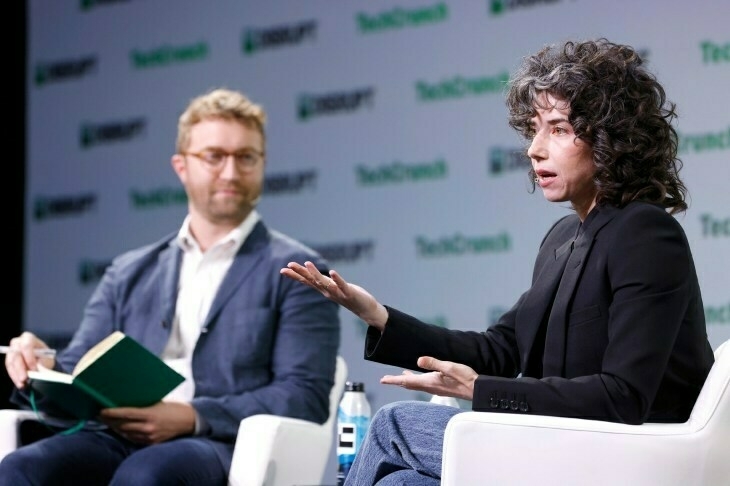
Why is it that so many companies that rely on monetizing the data of their users seem to be extremely hot on AI? If you ask Signal president Meredith Whittaker (and I did), she’ll tell you it’s simply because “AI is a surveillance technology.”Source: Signal’s Meredith Whittaker: AI is fundamentally ‘a surveillance technology’ | TechCrunchOnstage at TechCrunch Disrupt 2023, Whittaker explained her perspective that AI is largely inseparable from the big data and targeting industry perpetuated by the likes of Google and Meta, as well as less consumer-focused but equally prominent enterprise and defense companies. (Her remarks lightly edited for clarity.)
“It requires the surveillance business model; it’s an exacerbation of what we’ve seen since the late ’90s and the development of surveillance advertising. AI is a way, I think, to entrench and expand the surveillance business model,” she said. “The Venn diagram is a circle.”
“And the use of AI is also surveillant, right?” she continued. “You know, you walk past a facial recognition camera that’s instrumented with pseudo-scientific emotion recognition, and it produces data about you, right or wrong, that says ‘you are happy, you are sad, you have a bad character, you’re a liar, whatever.’ These are ultimately surveillance systems that are being marketed to those who have power over us generally: our employers, governments, border control, etc., to make determinations and predictions that will shape our access to resources and opportunities.”
Screens, addiction, and parenting
I spent my lunchtime packaging up my beloved PlayStation 5. I’m going to send it to my brother-in-law and his family until my son heads off to university. This directly impacts me and my extra-curricular activities, but I’m at my wits end.
He can’t control his use of it, sadly. Combined with his use of a smartphone, I feel like I’ve failed as a parent despite all of the things I’ve tried. I wrote my doctoral thesis on digital literacies, for goodness sake.
Ben Werdmuller’s at the other end of the spectrum with his son. I wish him the best of luck.

We walk our son to daycare via the local elementary school. This morning, as we wheeled his empty stroller back past the building, a school bus pulled up outside and a stream of eight-year-olds came tumbling out in front of us. As we stood there and watched them walk one by one into the building, I saw iPhone after iPhone after iPhone clutched in chubby little hands. Instagram; YouTube; texting.Source: Parenting in the age of the internet | Ben WerdmullerIt’s obvious that he’ll get into computers early: he’s the son of someone who learned to write code at the same time as writing English and a cognitive scientist who does research for a big FAANG company. Give him half a chance and he’ll already grab someone’s phone or laptop and find modes none of us knew existed — and he’s barely a year old. The only question is how he’ll get into computers.
[…]
He’s entering a very different cultural landscape where computers occupy a very different space. Those early 8-bit machines were, by necessity, all about creation: you often had to type in a BASIC script before you could use any software at all. In contrast, today’s devices are optimized to keep you consuming, and to capture your engagement at all costs. Those iPhones those kids were holding are designed to be addiction machines.
Conspicuously sesquipedalian communication
Getting people to understand your ideas is a difficult thing. That’s why it’s been so gratifying to work at various times with Bryan Mathers over the last decade. We humans are much better at processing visual inputs than deciphering text.
That being said, as Derek Thompson shows in this article, you have to begin with the realisation that simple is smart. It’s much easier to just write down what’s in your head that do so in a way that’s easy for others to understand.
In some ways, this reminds me of my work on ambiguity, which was a side-product of the work I did on my doctoral thesis. It’s also a good reminder that one of the best uses that most people can make of AI tools such as ChatGPT is to simplify their work.

High school taught me big words. College rewarded me for using big words. Then I graduated and realized that intelligent readers outside the classroom don’t want big words. They want complex ideas made simple. If you don’t believe it from a journalist, believe it from an academic: “When people feel insecure about their social standing in a group, they are more likely to use jargon in an attempt to be admired and respected,” the Columbia University psychologist Adam Galinsky told me. His study and other research found that when people use complicated language, they tend to come across as low-status or less intelligent. Why? It’s the complexity trap: Complicated language and jargon offer writers the illusion of sophistication, but jargon can send a signal to some readers that the writer is dense or overcompensating. Conspicuously sesquipedalian communication can signal compensatory behavior resulting from suboptimal perspective-taking strategies. What? Exactly; never write like that. Smart people respect simple language not because simple words are easy, but because expressing interesting ideas in small words takes a lot of work.Source: Why Simple Is Smart | The Atlantic
What people are really using generative AI for
As I’ve written several times before here on Thought Shrapnel, society seems to act as though the giant, monolithic, hugely profitable porn industry just doesn’t… exist? This despite the fact it tends to be a driver of technical innovation. I won’t get into details, but feel free to search for phrases such as ‘teledildonics’.
So this article from the new (and absolutely excellent) 404 Media on a venture capitalist firm’s overview of the emerging generative AI industry shouldn’t come as too much of a surprise. As a society and as an industry, we don’t make progress on policy, ethics, and safety by pretending things aren’t happening.
As the father, seeing this kind of news is more than a little disturbing. And we don’t deal with all of it by burying our head in the sand, shaking our head, or crossing our fingers.
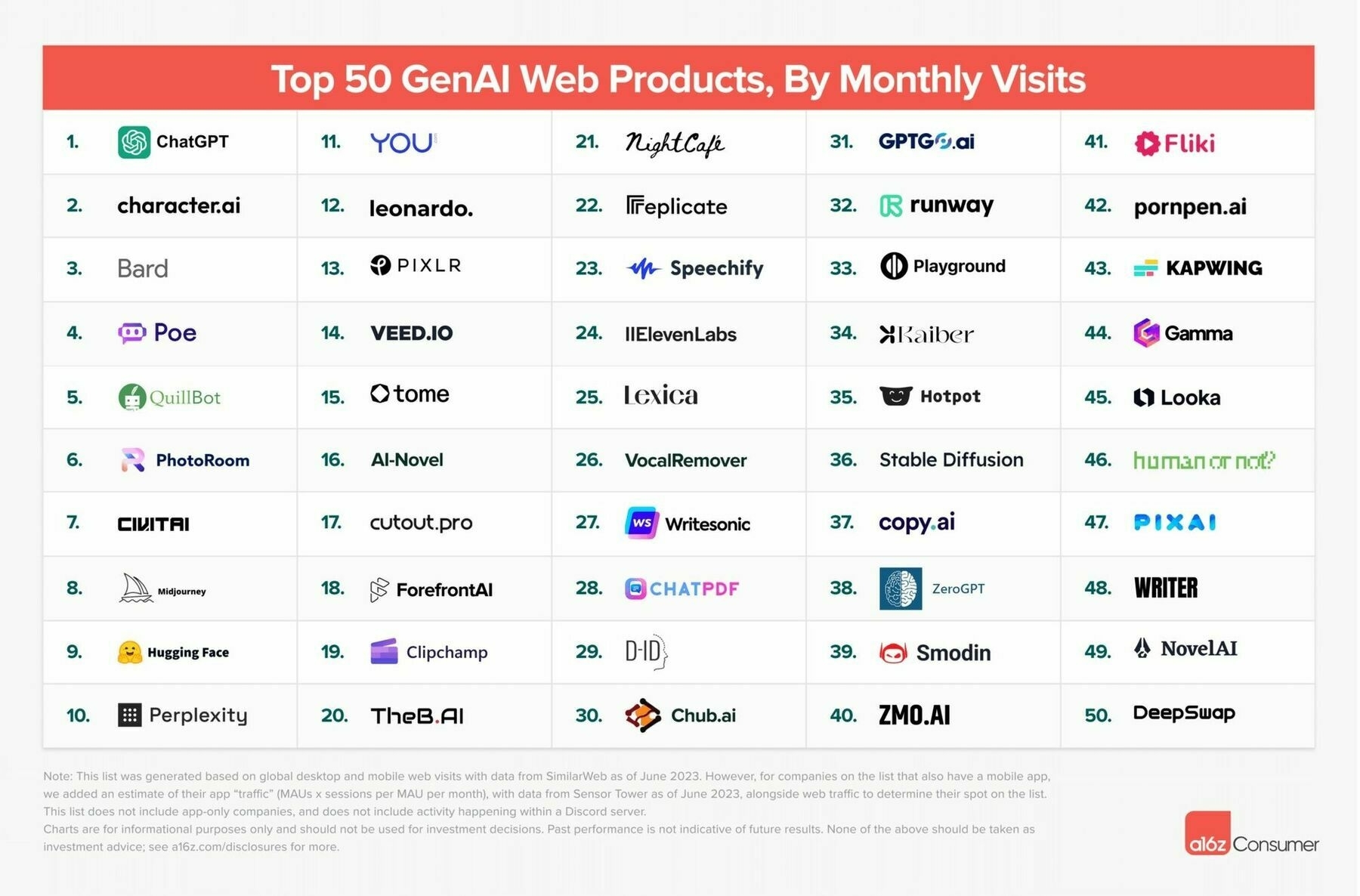
The Andreesen Horowitz (also called a16z) analysis is derived from crude but telling data—internet traffic. Using website traffic tracking company Similarweb, a16z ranks the top 50 generative AI websites on the internet by monthly visits, as of June 2023. This data provides an incomplete picture of what people are doing with AI because it’s not tracking use of popular AI apps like Replika (where people sext with virtual companions) or Telegram chatbots like Forever Companion, which allows users to talk to chatbots trained on the voices of influencers like Amouranth and Caryn Marjorie (who just want to talk about sex).Source: 404 Media Generative AI Market Analysis: People Love to Cum[…]
What I can tell you without a doubt by looking at this list of the top 50 generative AI websites is that, as has always been the case online and with technology generally, porn is a major driving force in how people use generative AI in their day to day lives.
[…]
Even if we put ethical questions aside, it is absurd that a tech industry kingmaker like a16z can look at this data, write a blog titled “How Are Consumers Using Generative AI?” and not come to the obvious conclusion that people are using it to jerk off. If you are actually interested in the generative AI boom and you are not identifying porn as core use for the technology, you are either not paying attention or intentionally pretending it’s not happening.
Oh great, another skills passport
I’ve spent the last 12 years working in the ecosystem around Open Badges, which provides an alternative accreditation system. It didn’t come out of thin air, and before this there was plenty of work around e-portfolios. Next up we’ve got Verifiable Credentials which allow for lots of things, including endorsement.
Frustratingly, over the past couple of decades, people several steps removed from actual jobs markets and education systems decide to weigh in. Inevitably, they use the metaphor closest to hand, which tends to be a ‘passport’.
This not only is the wrong metaphor, but it diverts money and attention from fixing some of the real issues in the system. I’d suggest that these are at least threefold:
- Taxonomic straightjackets — we don't tend to recognise everything that makes for a valuable employee or colleague. There are behaviours that are valuable, as well esoteric knowledge and skills that don't fit into pre-defined taxonomies.
- Hiring is broken — this deserves a whole other blog post, but current systems tend to automate the very things that need a human touch. Hence, applicants spend an inordinate amount of time searching for and applying for jobs, while algorithms reject people who would be a perfectly good fit.
- References are outdated — one organisation I used to work for stopped taking references because a) in most jurisdictions, it's against the law to make negative comments, and b) they're generally unreliable. Yet the whole system is predicated on them. Endorsements and recommendations based on network relationships are much more valuable.

The passport system is intended to help workers advertise their full range of qualifications, micro-credentials, prior learning, workplace experience and general capabilities.Source: National Skills Passport: Government aims to connect workers and employers | SBS NewsBusinesses, unions, tertiary institutions and students are among those the federal government says will be consulted about the initiative.
Treasurer Jim Chalmers said the goal was to make it easier for employers to find highly-qualified staff and for workers to have their qualifications recognised.
“We want to make it easier for more workers in more industries to adapt and adopt new technology and to grab the opportunities on offer in the defining decade ahead of us,” Chalmers said.
If your heart isn’t it, it’s probably because there’s no heart anywhere in the process
One thing I’ve learned spending over a decade thinking about Open Badges and alternative credentials is that hiring is broken. Although there are mitigations and workarounds — some of which I’ve implemented when hiring a team and helping others do so — the whole thing is a dumpster fire.
This article by Paul Fuhr discusses the horror show that is job hunting in the age of platforms such as Indeed. He does a great job of showing how automated and dehumanising the whole hiring process is. Platforms are more focused on user engagement than genuinely aiding job seekers; applicants are reduced to mere data points.
Not only that, but the lack of human-centricity to the whole thing fails to accommodate those with non-linear careers while simultaneously trivialising the job search process. Unsurprisingly, he’s calling for root-and-branch reform of the current job market. I can’t help but think that badges and alternative credentials can make the whole thing more transparent and fair, moving away from automated metrics.
I’ve applied for (quite literally) thousands of jobs. Very quickly, I went from being surgically precise about job applications to taking a shotgun-blast approach to it all, spraying applications out in every direction. I’ve clicked the “Submit” button on countless career sites. I’ve created four different versions of my resume. I’ve spent more time on LinkedIn than any other site, too, though I suspect Reddit is happy to have some server bandwidth back.Source: Why Resumes Are Dead & How Indeed.com Keeps Killing the Job Market | Paul FuhrSearching for a steady job is a disheartening and depressingly tedious affair, but it doesn’t have to be. If I’m qualified for anything at the moment, though, it’s being qualified to weigh in on the contemporary job-search experience. I know what it is, what it isn’t, what it pretends to be, why it no longer works, and what needs to change. And thanks to a year-plus of trying to find consistent work, it’s no longer about connecting me with the job of my dreams — it’s about connecting me with my dream of simply having a job.
[…]
Machine learning, AI, automation, yadda yadda yadda. I get it. I understand the “why” of automating the hiring process; I even think it can be a helpful (jargon alert) “arrow in the quiver” for HR. I can’t even imagine a single HR specialist being tasked to locate the right candidate from a huge field of applicants for one job, let alone fifteen jobs at once. That’s like finding a needle in a stack of needles. It’d be paralyzing.
That said, hiring managers and job seekers have arrived at a truly dangerous intersection. Employers have allowed automation to creep in and govern so much of the HR process that it threatens to ignore the whole…well, you know, human part of it all. And some companies insist on doubling-down on this façade; I’ve visited a shocking number of sites that pretend to have an actual human person ready to chat with you (certainly not a bot!), as if they’re impossibly waiting 24/7 to answer your questions.
We’re at a maddeningly mindless moment when it comes to finding employment, but it’s one that could be repaired with some maddeningly simple ideas. For starters, just bring back some humans. Robots can parse your past and distill you down into data, but they’ll never make a genuine connection or get a sense of you are. Also, simplicity works both ways: it benefits the applicant as much as an HR specialist.
A trickle, a ripple, a slow rush
This article by Antonia Malchik reflects on her personal journey moving back to her hometown in Montana. It focuses on her deep sense of gratitude for the natural environment and community. She discusses the annual Gathering of the Glacier-Two Medicine Alliance, celebrating the retirement of the last remaining oil lease in the area, which is significant for the Blackfeet Nation.
The part of the article in which I’m most interested is towards the end: a reflective moment by a creek. She writes about the importance of being present in nature and contemplating one’s place and responsibilities in the world. That feeling of being in and of nature after a day’s walking, feeling quite emotional. It stirs my soul just thinking about it.

On my way home, I stopped at a creek I’m fond of, near a trailhead leading into the Bob Marshall Wilderness. The parking lot was empty of other cars or people. Last year when I’d camped there, the creek had held a delightful number of cylindrical caddisfly shells constructed from gravel about the size of a sesame seed. I looked for them but it was too late in the year.Source: Sometimes there’s a right answer, sometimes you sit by a creek, and sometimes they’re the same thing | On The CommonsThe creek ran cold across my bare feet, its sound and movement and chilly reminders of snowmelt all I really need in this world to ground myself in what’s real, and what matters. I sat there letting my feet go numb and the sound run through me, September’s late afternoon sunlight filtering through the aspen trees to glance off the water.
I don’t even know what to call that sound—a trickle, a ripple, a slow rush?
Sometimes the right answer is an action. Sometimes it’s a change in policy, or in culture. And sometimes it’s simply being, sitting there by a creek reminding yourself what it feels like to be alive, in a place you love. It’s asking questions of belonging and responsibility, and struggling with your own place in the world.
That sound is all of life to me. I could have sat there forever, grown cold and hungry, but I never for a moment would have felt alone.
If LLMs are puppets, who's pulling the strings?
The article from the Mozilla Foundation surfaces into the human decisions that shape generative AI. It highlights the ethical and regulatory implications of these decisions, such as data sourcing, model objectives, and the treatment of data workers.
What gets me about all of this is the ‘black box’ nature of it. Ideally, for example, I want it to be super-easy to train an LLM on a defined corpus of data — such as all Thought Shrapnel posts. Asking questions of that dataset would be really useful, as would an emergent taxonomy.
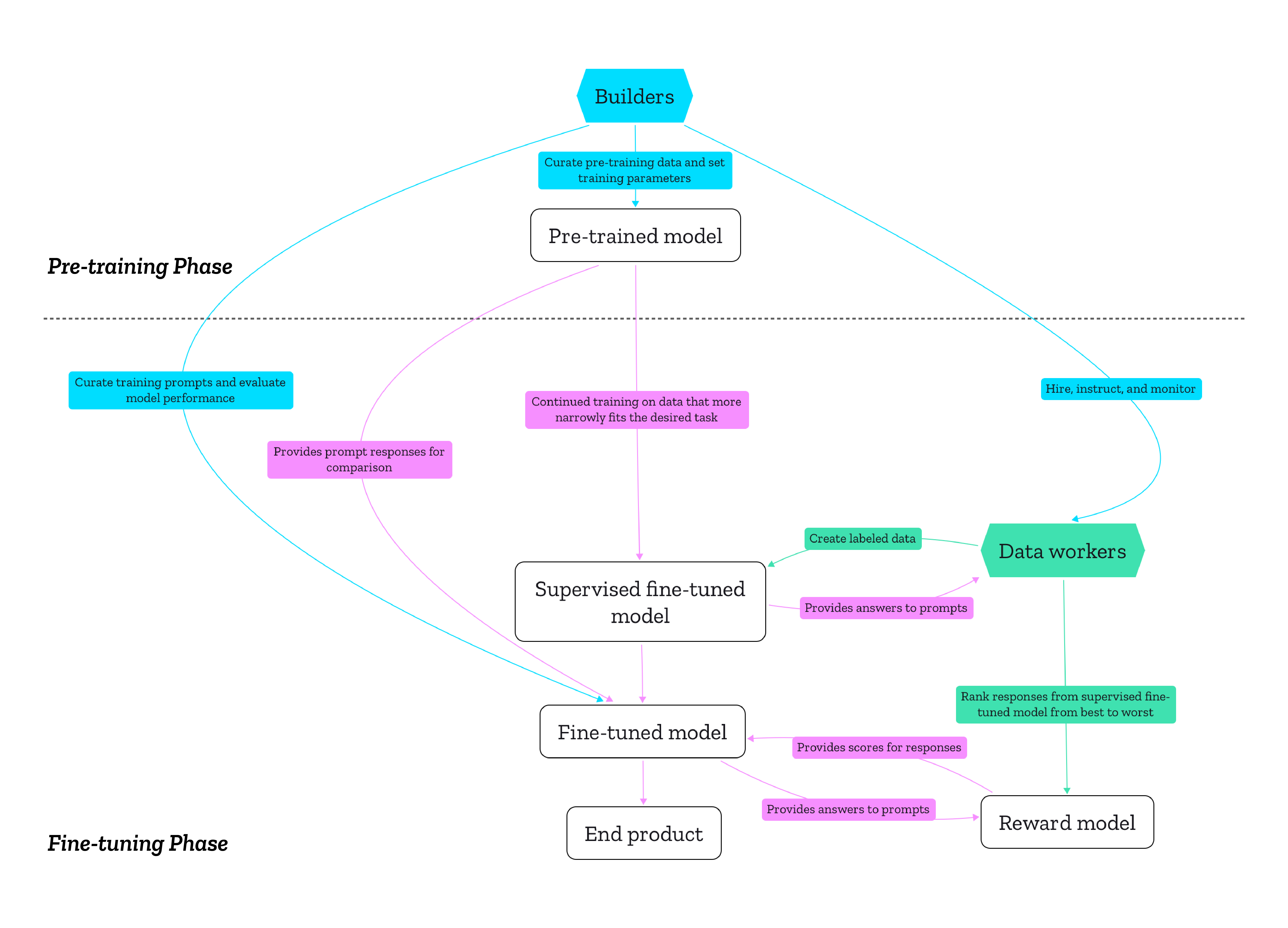
Generative AI products can only be trustworthy if their entire production process is conducted in a trustworthy manner. Considering how pre-trained models are meant to be fine-tuned for various end products, and how many pre-trained models rely on the same data sources, it’s helpful to understand the production of generative AI products in terms of infrastructure. As media studies scholar Luke Munn put it, infrastructures “privilege certain logics and then operationalize them”. They make certain actions and modes of thinking possible ahead of others. The decisions of the creators of pre-training datasets have downstream effects on what LLMs are good or bad at, just as the training of the reward model directly affects the fine-tuned end product.Source: The human decisions that shape generative AI: Who is accountable for what? | Mozilla FoundationTherefore, questions of accountability and regulation need to take both phases seriously and employ different approaches for each phase. To further engage in discussion about these questions, we are conducting a study about the decisions and values that shape the data used for pre-training: Who are the creators of popular pre-training datasets, and what values guide their work? Why and how did they create these datasets? What decisions guided the filtering of that data? We will focus on the experiences and objectives of builders of the technology rather than the technology itself with interviews and an analysis of public statements. Stay tuned!
Bad historical maps
Like the author of this article, I love a good map. Whether it’s trekking across hills and mountains with an OS map, or looking through historical maps, there’s something enchanting about understanding territories.
The thing is, though, that maps are literally projections. They leave things out and therefore have to be interpreted. If the maps are out of date, or are being used in a way that’s anachronistic, that leads to a huge problem.
As a History teacher, I used to teach WWI but didn’t know that General von Schlieffen, the Chief of the German General Staff, was obsessed with Hannibal and the Battle of Cannae. Apparently he used stories and maps of how it played out to inform his strategy. The problem was that, not only did it happen a couple of millennia beforehand, but it probably didn’t even play out that way.

Maps like this are a big part of why I became a historian. I probably spent more time looking through the volumes of Colin McEvedy’s Penguin Atlas of History series than any other book when I was a kid.... There’s something beguiling about the thought that a simple arrangement of lines might explain the world — like seeing human history as an enormous game of Civilization 6. But of course, that’s also the problem with using maps as a way of understanding history. If you’re not careful, they go from being helpful tools to misleading simplifications.Source: Historical maps probably helped cause World War I | Res Obscura[…]
In her book The Guns of August, Barbara Tuchman argues that the memory of Cannae, which was passed down through a succession of military histories until it became a virtual obsession of strategists in the 19th century, helped push the world into an unimaginable catastrophe.
It did so by offering up a model of a “battle of annihilation” that Germany’s war planners believed they could unleash on France. At the head of these planers was General von Schlieffen, the Chief of the German General Staff. The map of Cannae haunted Schlieffen’s dreams.
[…]
Cannae was no vague inspiration. It was a direct model for Germany’s invasion of Belgium and France.
[…]
As the historian Martin Samuels pointed out in his article “the Reality of Cannae,” there is no archaeological evidence for the battle. Nor are there first-hand sources of any kind. Everything we know derives from accounts written sixty years or more after Cannae itself. Suffice to say, when Samuels dug into these sources, he found as many questions as answers. The detailed maps of movements at Cannae that decorated military strategy manuals for hundreds of years, in other words, were largely fanciful. Samuels calls Cannae “the most quoted and least understood battle” in history.
The simplicity of a historical map — the clear labels, the sharp edges, and above all the reduction of thousands or millions of people into abstract symbols — is a big part of why they’re so beguiling. But it’s also why they lead us astray.
[…]
It is sometimes said that the map is not the territory. The map is not the historical argument, either.
Instead, maps are a great way to pose questions about history. They are best approached as a way in: an entry-point rather than an ending. They offer one path toward confronting the enormous complexity of “real” history — the kind made by individual people, on the decidedly imperfect and unmap-like terrain of the world.
More treasures and secrets from ancient Egypt
Underwater archaeologists have discovered a sunken temple off Egypt’s Mediterranean coast, filled with artefacts related to the god Amun and the goddess Aphrodite. The temple was part of the ancient port city of Thonis-Heracleion, which sank due to a major earthquake and tidal waves.
When we discover the remnants of civilizations buried under the sea and in other places it does make me think about humans in the future discovering what we leave behind. What will they think?

While exploring a canal off the Mediterranean coast of Egypt, underwater archaeologists discovered a sunken temple and a sanctuary brimming with ancient treasures linked to the god Amun and the goddess Aphrodite, respectively.Source: Sunken temple and sanctuary from ancient Egypt found brimming with ‘treasures and secrets’ | Live ScienceThe temple, which partially collapsed “during a cataclysmic event” during the mid-second century B.C., was originally built for the god Amun; it was so important, pharaohs went to the temple “to receive from the supreme god of the ancient Egyptian pantheon the titles of their power as universal kings,” according to a statement from the European Institute for Underwater Archaeology (IEASM).
[…]
Also at the site divers found underground structures supported by “well-preserved wooden posts and beams” that dated to the fifth century B.C., they wrote in the statement.
[…]
The sanctuary also held a cache of Greek weapons, which could indicate that Greek mercenaries were in the region at one time “defending the access to the Kingdom” at the mouth of the Nile’s westernmost, or Canopic, branch, the researchers said in the statement.
Death, wrecks, and harsh weather
There was a time, about a decade ago, where although I was based from home, I’d be travelling pretty much every week for work. I was abroad once a month at least.
These days, perhaps with the pandemic as a catalyst, I’m slightly more wary of travelling. It’s probably also a function of age and awareness of how routines affect my body. As an historian, though, I’ve always been amazed by those people who journeyed long distances.
This post by an academic historian of medicine and the body outlines some of the dangers such travellers faced. Pretty amazing, when you think about it.

Unlike today, when it’s entirely possible to have breakfast in London, lunch in Milan and be back at home in time for supper, travel in the early modern period was no easy undertaking. More than this, it was widely acknowledged to be inherently dangerous. What, then, were the perceived risks? Even a brief survey tells us a lot about how travel was regarded in health terms.Source: The Health Risks of Travel in Early-Modern Britain | Dr Alun WitheyFirst was the risk of accident or death on the journey. In the seventeenth century even relatively short distances on horseback or in a carriage carried dangers. Falls from horses were common, causing injury or even death.
[…]
Travel by sea, even around local coasts, carried its own obvious risks of storm and wreck. So common and widely acknowledged were the vagaries of sea travel that a common reason for making a will in the early modern period was just before embarking on a voyage.
[…]
Once abroad, too travellers were at the mercy of a bevy of dangers, from unfamiliar territories and extreme landscapes to harsh weather and climate, their safety contingent on the quality of their transport and the reliability of their guides.
[…]
Even ‘foreign’ food and drink could be risky. Thomas Tryon’s Miscellania (1696) noted the dangers of ‘intemperance’ and of misjudging the effects of climate upon the body in regard to drinking alchohol [sic]
Microcast #98 — Endorsement
The introduction to some thoughts on endorsement using Open Badges and Verifiable Credentials within networks of trust.
Show notes
- The Value of Credentials Endorsement
- The role of endorsement in Open Badges and Open Recognition
- Endorsement using Open Badges and Community Recognition
Image: Unsplash
Virtual spaces for learning and collaboration
Today, I’ve been doing a UCL short course. As we were coming back from a break, we were discussing the lack of ‘embodiedness’ in virtual interactions. This reminded me of experiments with different platforms that WAO did during the pandemic.
This post by Alja from Tethix is prompted by a challenge-based learning platform that I took part in last year. They’re focusing on tech ethics (hence the name) and their approach was great. It was just that the tools got in the way to some extent.
I think, after reading this, it’s time to experiment again with some of the tools mentioned in the post. Sometimes you do need a sense of play and feel like you’re connected in ways that go beyond small boxes on a screen.
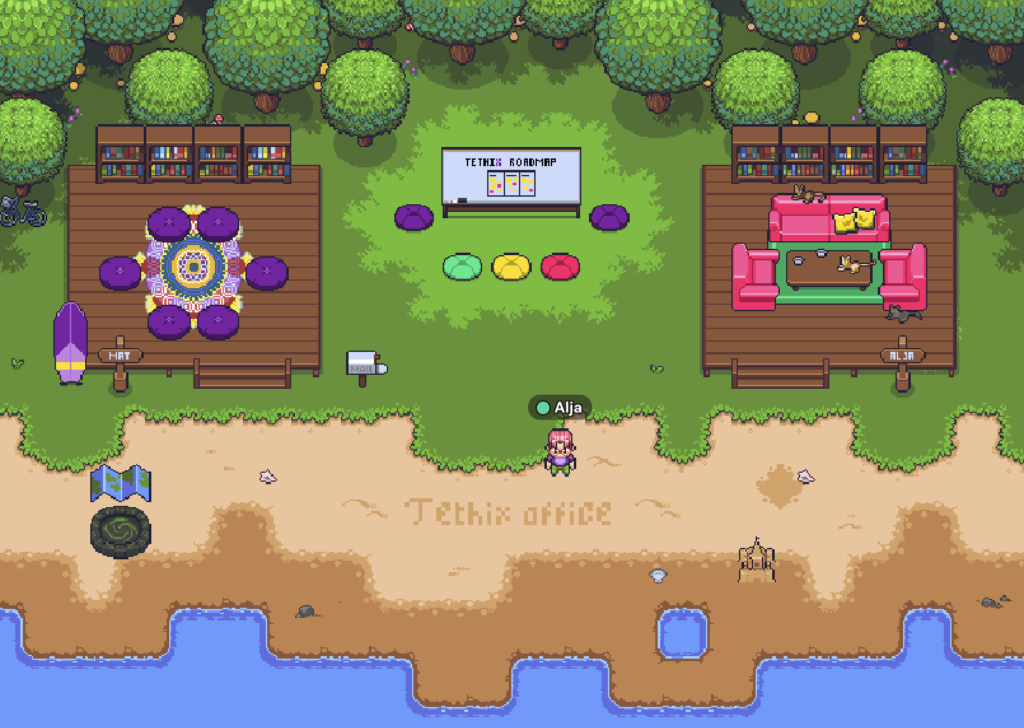
The Tethix Archipelago emerged from the Challenge Based Learning pilot we did in March last year. For the pilot, we designed a unique collaborative online learning experience in tech ethics and used Mural collaborative whiteboards and visual storytelling to situate the learning journey in a fictional world: the Tethix Archipelago. The Archipelago consists of four islands that emerged from the four essentials skills of the Challenge Based Learning journey: collaboration, exploration, practice, and reflection.Source: Welcome to the Tethix Archipelago | TethixMural turned out to be a great tool for collaboration and live session guidance, but it didn’t really convey a sense of place. Clicking on a link in a Mural to visit the next leg of your journey just doesn’t feel like traveling, especially when you’re trapped in the same little Zoom box during every live session.
So we started exploring tools that could help us convey a sense of space and discovered Gather and WorkAdventure, among others. These tools offer two-dimensional virtual collaborative spaces where you can walk around a space with your avatar and have proximity-based conversations by using your microphone and camera.
[…]
You might be thinking: this is cute and all, but is this Archipelago all games and play? Well, playfulness is a big part of why we’re experimenting with these game-like worlds; we know that play helps us learn better and can unlock our imagination. But there’s much more to it than just millennial nostalgia for pixel graphics.
As already mentioned, Gather allows us to build a sense of place, both inside rooms and between them. And a sense of place helps with learning and memory encoding. Historical records show ancient Greeks using the method of loci or memory palaces, a technique for improving memory encoding and retrieval, and humans have been developing other mnemonic techniques based on spatial relationship for much longer than that. We’re physical beings, uniquely equipped to understand space, whether physical or represented by pixels.
The Social Media Archipelago
On 1st October, I’ll be transitioning the Thought Shrapnel newsletter to Substack. More about that here. What’s interesting is the ecosystem that’s being created there — including Substack Notes, which is where I came across this post.
I’ve several things to say about this hand-drawn map of the ‘social media archipelago’. First, as the top commenter on the post notes, it’s similar to a classic xkcd cartoon from 2007 and shows how much the landscape has changed.
Second, Chelsea Troy quite rightly points out that we’ve got a Twitter-shaped hole in the internet, which people are filling with either private communities (Slack/Discord), the Fediverse (Mastodon, etc.), or Twitter-like things (Bluesky, etc.)
What I think they’re missing is.. Substack Notes. For someone who loves reading and writing, it’s full of interesting people sharing thoughtful things. You can find my notes here.
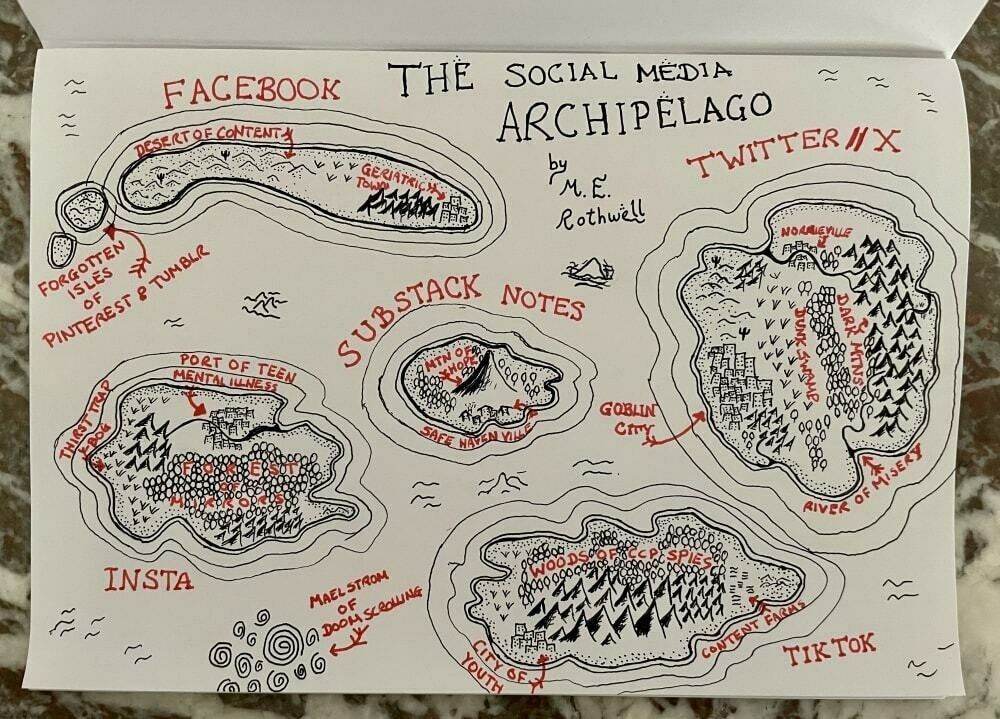
To anyone looking to navigate the ongoing perils of social media, it can be a challenging and daunting task. An adventure marked by intense trepidation and foreboding, by fear and doubt. But worry no longer, I have drawn a map.Source: Note by M. E. Rothwell on SubstackI present to you, The Social Media Archipelago.
Whether you’re lost among the Musky Mountains or the Dunk Swamps of Twitterland, or in the selfie-obsessed Forest of Mirrors on the Isle of Insta, I hope this chart can be a helpful guide on your journey. Never again be stranded among the bleak deserts of Facebook, no interesting content in sight. Never again be sucked into the maelstrom of the Doomscroll, forever locked among the whirlpools of cheap dopamine hits.
Instead, look toward the lone peak of innocent hopes, reminiscent of the heady days of the early internet, where healthy conversation and good faith debate may yet flourish. Look to the terra novalis, known to the early cartographers as the mythical land of Substackus Notum.
Or in the common tongue — Substack Notes.
(it was a slow day at work ok)
